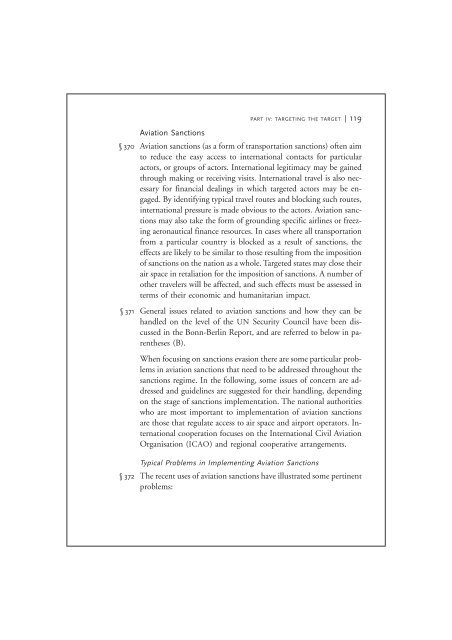Making Targeted Sanctions Effective - Small Arms Survey
Making Targeted Sanctions Effective - Small Arms Survey
Making Targeted Sanctions Effective - Small Arms Survey
Create successful ePaper yourself
Turn your PDF publications into a flip-book with our unique Google optimized e-Paper software.
PART IV: TARGETING THE TARGET | 119<br />
§ 370<br />
§ 371<br />
§ 372<br />
Aviation <strong>Sanctions</strong><br />
Aviation sanctions (as a form of transportation sanctions) often aim<br />
to reduce the easy access to international contacts for particular<br />
actors, or groups of actors. International legitimacy may be gained<br />
through making or receiving visits. International travel is also necessary<br />
for financial dealings in which targeted actors may be engaged.<br />
By identifying typical travel routes and blocking such routes,<br />
international pressure is made obvious to the actors. Aviation sanctions<br />
may also take the form of grounding specific airlines or freezing<br />
aeronautical finance resources. In cases where all transportation<br />
from a particular country is blocked as a result of sanctions, the<br />
effects are likely to be similar to those resulting from the imposition<br />
of sanctions on the nation as a whole. <strong>Targeted</strong> states may close their<br />
air space in retaliation for the imposition of sanctions. A number of<br />
other travelers will be affected, and such effects must be assessed in<br />
terms of their economic and humanitarian impact.<br />
General issues related to aviation sanctions and how they can be<br />
handled on the level of the UN Security Council have been discussed<br />
in the Bonn-Berlin Report, and are referred to below in parentheses<br />
(B).<br />
When focusing on sanctions evasion there are some particular problems<br />
in aviation sanctions that need to be addressed throughout the<br />
sanctions regime. In the following, some issues of concern are addressed<br />
and guidelines are suggested for their handling, depending<br />
on the stage of sanctions implementation. The national authorities<br />
who are most important to implementation of aviation sanctions<br />
are those that regulate access to air space and airport operators. International<br />
cooperation focuses on the International Civil Aviation<br />
Organisation (ICAO) and regional cooperative arrangements.<br />
Typical Problems in Implementing Aviation <strong>Sanctions</strong><br />
The recent uses of aviation sanctions have illustrated some pertinent<br />
problems:
















